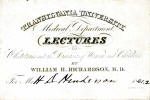William Richardson, M.D.
Click image to enlarge
The Dudley-Richardson Duel:
When he joined the Transylvania faculty, Drake was unprepared for the academic polemics, and worse, that he encountered. But he later demonstrated a natural aptitude for the art of invective.
Dissension had erupted during the organizational meeting of the medical faculty at the beginning of the year, and continued throughout the session. Controversy was stirred when Benjamin Dudley, Professor of Anatomy and Surgery, objected to the presence on the faculty of William Richardson, Professor of Obstetrics, who held no degree in medicine. Tension remained high after the session ended in early March 1818 and a conflagration, to be ignited, needed only a spark.
This was provided by Drake's letter of resignation from the faculty in late March of 1818. Dudley openly accused Drake of breaking a promise to remain on the faculty two years, and of trying to destroy the Transylvania Medical College. In the ensuing correspondence with Drake, Dudley made insulting references to Richardson who became incensed when they came to his attention, and challenged Dudley to a duel. Although illegal in Kentucky, duels were still countenanced in defense of a "gentleman's honor", broadly construed. Dudley accepted the challenge and chose pistols as the weapons. To avoid intervention by the authorities, the duel took place in secrecy in the summer of 1818. Dudley's shot struck Richardson in the groin, lacerating a major artery, presumably the femoral. He would probably have bled to death from the wound had not Dudley rushed to his side and made pressure with his thumb on the artery proximally, thereby preventing further blood loss while Richardson's surgeon tied the vessel - without the benefit of either anesthesia or asepsis, both then unknown to medicine as we have already mentioned. All hail to the surgeon who performed this difficult operation on a patient stretched on the ground in a remote forest clearing.
Dudley recovered and, according to some versions of the affair, he and Richardson later became "fast friends." Although questionable, this outcome gains some credibility from the fact that they were both Past Masters of the Grand Lodge of the Fraternal Order of Masons in Kentucky. The Grand Lodge first suspended the duelists, and then reinstated them as a result of "the reconciliation which has happily taken place between said brothers." [65]
The unfortunate Richardson had in Drake at least one forthright and effective advocate. Recognizing the importance to Richardson of obtaining medical credentials if he was to survive in the academic arena, Drake on 31 December 1817 wrote to David Hosack, MD, at the College of Physicians and Surgeons in New York requesting that Richardson be given an honorary MD degree.The Honorary degree of Doctor of Medicine was awarded to Richardson on 6 April 1819, thus bespeaking Drake's already considerable stature in the medical profession at the age of 33. The cause of the delay in awarding the degree is unknown but was probably related to the complicated process by which such degrees were conferred, not by the College but by the Regents of the University of the State of New York.
